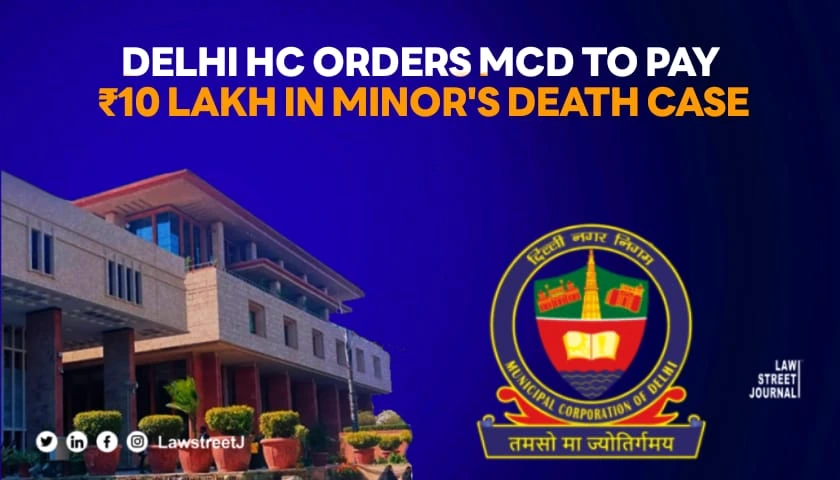New Delhi: The Delhi High Court has directed the Municipal Corporation of Delhi (MCD) to pay Rs. 10 lakh as compensation for the death of a minor boy due to negligence, while applying the principle of res ipsa loquitur and affirming the power of constitutional courts to award compensation in cases of fundamental rights violations.
A Single Judge Bench comprising Justice Purushaindra Kumar Kaurav heard a writ petition (W.P.(C) 4202/2008) filed by Munna and Smt. Mumtaz, parents of a 17-year-old boy who died when a slab/lantern fell on him from MCD-owned premises on July 27, 2007.
“It is thus vividly observed that the respondent-MCD had prior knowledge of its quarters being in a dangerous and dilapidated condition. Thus, the fact that the respondent-MCD was negligent in maintaining the safe condition of the said quarters is manifestly evident from the record,” the court observed.
Highlighting MCD’s statutory responsibility, the court stated, “The responsibility to ensure the proper maintenance of the premises in question unequivocally rested upon the respondent-MCD, which is predominantly cast with a bounden duty to maintain and repair constructions in dangerous conditions within the territorial limits of Delhi.” The court cited Section 348 of the Delhi Municipal Corporation Act, 1957, which mandates the MCD to take action against dangerous buildings.
Recognizing the applicability of res ipsa loquitur, the court emphasized, “The present case is thus squarely covered by the maxim res ipsa loquitur, as the negligence of the respondent-MCD in failing to adequately maintain the premises is manifestly evident from the record.” The court rejected MCD’s arguments that the boy may have entered the premises with the intent to steal, finding them unsubstantiated.
The court calculated the compensation based on previous judgments, particularly referring to the principles laid down in Kamla Devi v. Govt. of NCT of Delhi. The calculation considered factors such as standard compensation and loss of dependency, adjusting for inflation and the Consumer Price Index for Industrial Workers (CPI-IW).
Additionally, the court reaffirmed the power of constitutional courts to award compensation in cases of fundamental rights violations, even when there are some disputed facts. Justice Kaurav noted, “It is settled law that where the negligence and breach of duty by the State are writ large, and the duty of care is found to be specifically of the public authorities, the maxim res ipsa loquitur shall apply.”
In conclusion, while disposing of the writ petition, the court directed MCD to pay Rs. 10 lakh with 6% simple interest from the date of death (27.07.2007) until realization, within 3 months. The court also observed that, “Any failure to comply with the aforesaid direction shall result in the petitioners being entitled to payment of additional simple interest at the rate of 10% per annum, accruing from today.”



![Delhi High Court Sets Aside Arbitral Tribunal's Award Against NHAI in Highway Project Delay Case [Read Judgment]](/secure/uploads/2023/07/lj_9605_23374c2e-392c-4491-a2fe-f2f12fc5272f.jpg)
![Delhi Court Rejects Stay Request in Defamation Case Against Rajasthan CM Ashok Gehlot [Read Order]](/secure/uploads/2023/08/lj_5208_80de1ddc-d76a-4f7f-b180-408e3ae14fb4.jpg)





